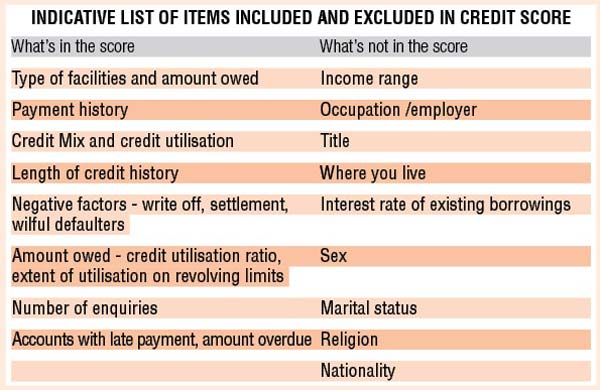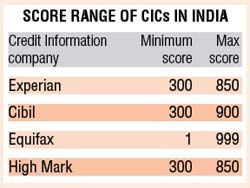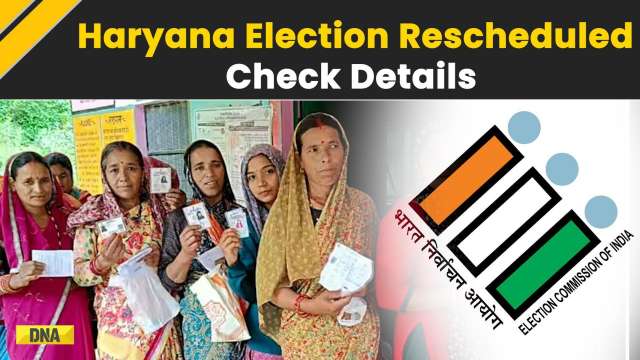The credit report is a compilation of borrowings, behaviour of repayment, enquiries made, demographic data of residential address, office address, trend of repayments, unique ID numbers (like PAN, driving license and Aadhar)
Till a few years ago, loan processing was more subjective in nature and inconsistent. However, with digitisation, we are in a whole new world of instant credit and insta-loans. Credit processes coupled with technological initiatives has transformed the entire customer experience ecosystem with institutions relying more on credit reports generated by credit information companies (CIC).
These CICs are regulated independent agencies which collate and aggregate customer data. At present, there are four credit rating agencies which provide ratings for individuals - CIBIL, Experian, Equifax and CRIF High Mark.
CIC generates a summarised report of all the borrowing facilities in the format known as credit report. The credit report is a compilation of borrowings, behaviour of repayment, enquiries made, demographic data of residential address, office address, trend of repayments, unique ID numbers (like PAN, driving license and Aadhar), of an individual, reported over a period of time.
Credit Score can be compared to marks scored in the school report card. However, unlike school reports, your credit score is calculated basis algorithms, giving different weightages and relevance against each parameter of the credit report. The score evaluates your ability as an individual or an organisation to fulfil financial commitments.

 Credit reports and credit score help lenders gauge the repayment ability and willingness of a borrower on the basis of his past repayment behaviour. Scores help banks in making fair credit decisions, ensure faster processing, and optimise risks, basis the profile of customers. Credit report usage is not limited to just banks or financial institutions, but also visa processing companies, insurance companies, telecom companies, and most importantly your employers can use credit reports to know the profile of applicants. So if you plan to go abroad for further studies or simply travel, your credit report is crucial.
Credit reports and credit score help lenders gauge the repayment ability and willingness of a borrower on the basis of his past repayment behaviour. Scores help banks in making fair credit decisions, ensure faster processing, and optimise risks, basis the profile of customers. Credit report usage is not limited to just banks or financial institutions, but also visa processing companies, insurance companies, telecom companies, and most importantly your employers can use credit reports to know the profile of applicants. So if you plan to go abroad for further studies or simply travel, your credit report is crucial.
Lenders use credit reports for client's identification, account behaviour and enquiries of customers. Therefore, it becomes imperative as a customer to know what is included in the report and what is excluded. Variables used for calculation vary from one company to another, basis their score models.
How can consumers improve their scores?
The good news is that it is possible to improve your score – all you need to do is start taking concrete steps right away to improve the score. Here are some suggestions that can have a positive impact on your credit score.
Check your credit report: This is to ensure the correct listing of your loan accounts, correct reporting of payments and that the amount owed against each open account is correct. Reduce burden on revolving limits and use those responsibly : Even a single late payment, whether it is for loan or your credit card, has a negative impact on your score. Set up payment reminder for the credit card and bills due.
Use the right type of borrowing mix needs: For example, use credit cards for smaller purchases, car loan for car purchase and home loan for housing requirement. Problems crop up when consumers borrow short term loans for long term needs.
With these suggestions in place, it can take 6-18 months to improve your credit score. After all a good credit score is worth the patience and discipline, ensuring low interest rates and better credit terms.
There are many myths surrounding the issue of credit reports. Firstly, once a facility is closed, history of loan repayment too is removed. However, the fact is that credit report includes history of closed loans. All older history of good and bad repayments is included in the report. Another myth is that once defaulted and reported on bureau, an individual is not eligible for loans from banks. The fact is that credit report is one of the tools of assessment. Bankers look at the larger picture of overall profile and take a call on justified delays. And finally, credit score of joint applicant /guarantor is not impacted in case of default. However, credit score of applicant, co-applicant and guarantor is equally impacted due to adverse performance on bureau for particular facility.
The writer is senior group president – retail and business banking, YES Bank
![submenu-img]() 'I’ve done my part...': CSK star all-rounder bids adieu to international cricket
'I’ve done my part...': CSK star all-rounder bids adieu to international cricket![submenu-img]() Former Indian football team head coach Igor Stimac set to receive Rs 33600000 from AIFF as...
Former Indian football team head coach Igor Stimac set to receive Rs 33600000 from AIFF as...![submenu-img]() Lucknow building collapse: Police lodged FIR against owner as death toll rises to 8
Lucknow building collapse: Police lodged FIR against owner as death toll rises to 8![submenu-img]() Nicole Kidman skips receiving Best Actress award at Venice Film Festival due to her mother's death: 'I am in shock'
Nicole Kidman skips receiving Best Actress award at Venice Film Festival due to her mother's death: 'I am in shock'![submenu-img]() Asian Hockey Champions Trophy: Defending champions India beat China 3-0 in campaign opener
Asian Hockey Champions Trophy: Defending champions India beat China 3-0 in campaign opener![submenu-img]() Pakistan में भारी बवाल, इमरान खान के समर्थकों और पुलिस की झड़प में 7 की मौत
Pakistan में भारी बवाल, इमरान खान के समर्थकों और पुलिस की झड़प में 7 की मौत![submenu-img]() Kolkata Rape Case: बंगाल के राज्यपाल का ममता बनर्जी को अल्टीमेटम, 'कोलकाता पुलिस कमिश्नर को हटाएं'
Kolkata Rape Case: बंगाल के राज्यपाल का ममता बनर्जी को अल्टीमेटम, 'कोलकाता पुलिस कमिश्नर को हटाएं'![submenu-img]() Congress Candidate List: हरियाणा विधानसभा चुनाव के लिए कांग्रेस की दूसरी लिस्ट जारी, जानें किसे कहां से मिला मौका
Congress Candidate List: हरियाणा विधानसभा चुनाव के लिए कांग्रेस की दूसरी लिस्ट जारी, जानें किसे कहां से मिला मौका![submenu-img]() India squad for first Test vs Bangladesh: बांग्लादेश के खिलाफ पहले टेस्ट के लिए टीम इंडिया का ऐलान, यश दयाल की चमकी किस्मत
India squad for first Test vs Bangladesh: बांग्लादेश के खिलाफ पहले टेस्ट के लिए टीम इंडिया का ऐलान, यश दयाल की चमकी किस्मत![submenu-img]() रेसलर बजरंग पून�िया को मिली जान से मारने की धमकी, मैसेज में लिखा-'कांग्रेस छोड़ दो, ये हमारी पहली और आखिरी चेतावनी है'
रेसलर बजरंग पून�िया को मिली जान से मारने की धमकी, मैसेज में लिखा-'कांग्रेस छोड़ दो, ये हमारी पहली और आखिरी चेतावनी है'![submenu-img]() Jawa 42 FJ vs Royal Enfield Classic 350: Price, engine, specs compared
Jawa 42 FJ vs Royal Enfield Classic 350: Price, engine, specs compared ![submenu-img]() Bhavish Aggarwal’s Ola Electric set to challenge Mahindra, Bajaj as his company plans to launch…
Bhavish Aggarwal’s Ola Electric set to challenge Mahindra, Bajaj as his company plans to launch…![submenu-img]() Skoda-Auto Volkswagen India to invest Rs 15000 crore to set up EV plant in…
Skoda-Auto Volkswagen India to invest Rs 15000 crore to set up EV plant in…![submenu-img]() Hyundai Venue E+ with electric sunroof launched in India; price starts at Rs…
Hyundai Venue E+ with electric sunroof launched in India; price starts at Rs…![submenu-img]() DNA Auto Awards 2024: Maruti Suzuki Swift nominated for ‘CAR OF THE YEAR’; check price, features
DNA Auto Awards 2024: Maruti Suzuki Swift nominated for ‘CAR OF THE YEAR’; check price, features![submenu-img]() Meet woman, who got separated from her son, cracked UPSC exam to become IAS officer with AIR 2, she is...
Meet woman, who got separated from her son, cracked UPSC exam to become IAS officer with AIR 2, she is...![submenu-img]() Meet man, who cracked UPSC exam with AIR 646, became IPS officer, now suspended due to...
Meet man, who cracked UPSC exam with AIR 646, became IPS officer, now suspended due to...![submenu-img]() Marksheet of IAS Sonal Goel goes viral on social media, check her UPSC exam scores in different subjects
Marksheet of IAS Sonal Goel goes viral on social media, check her UPSC exam scores in different subjects![submenu-img]() Meet woman, who cracked UPSC exam at the age 22, became IAS officer, secured AIR 51, she is...
Meet woman, who cracked UPSC exam at the age 22, became IAS officer, secured AIR 51, she is...![submenu-img]() Meet IIT topper who left corporate job to become IAS officer, failed four times in UPSC exam, he is...
Meet IIT topper who left corporate job to become IAS officer, failed four times in UPSC exam, he is...![submenu-img]() Mumbai: Fire Breaks Out At Times Tower In Mumbai, 9 Fire Units Deployed
Mumbai: Fire Breaks Out At Times Tower In Mumbai, 9 Fire Units Deployed![submenu-img]() 'Dharavi Project Is About Restoring Dignity...', Says Gautam Adani | Dharavi Redevelopment Project
'Dharavi Project Is About Restoring Dignity...', Says Gautam Adani | Dharavi Redevelopment Project![submenu-img]() Kolkata Doctor Case: CBI Visits RG Kar, Seizes Documents On Funds Used During Sandip Ghosh’s Tenure
Kolkata Doctor Case: CBI Visits RG Kar, Seizes Documents On Funds Used During Sandip Ghosh’s Tenure![submenu-img]() Giriraj Singh Attacked: Union Minister Giriraj Singh Assaulted In Begusarai, Bihar; Accused Arrested
Giriraj Singh Attacked: Union Minister Giriraj Singh Assaulted In Begusarai, Bihar; Accused Arrested![submenu-img]() Haryana Assembly Election 2024: Haryana Assembly Election Date Changed, Check Details Here
Haryana Assembly Election 2024: Haryana Assembly Election Date Changed, Check Details Here![submenu-img]() Meet Indian man, who is likely to become world's 2nd trillionaire after Elon Musk, has net worth of...
Meet Indian man, who is likely to become world's 2nd trillionaire after Elon Musk, has net worth of...![submenu-img]() Ratan Tata's company invests Rs 950 crore in this firm, plans to build...
Ratan Tata's company invests Rs 950 crore in this firm, plans to build...![submenu-img]() Meet Indian genius who established 10 famous brands, built Rs 10000 crore company, not from IIT, IIM, runs iconic...
Meet Indian genius who established 10 famous brands, built Rs 10000 crore company, not from IIT, IIM, runs iconic...![submenu-img]() Meet man who earns over Rs 11 crore monthly, highest-paid executive in Indian company, he is Ratan Tata's...
Meet man who earns over Rs 11 crore monthly, highest-paid executive in Indian company, he is Ratan Tata's...![submenu-img]() Meet woman, an Indian, who is CEO of Rs 55683 crore company in US, her business is...
Meet woman, an Indian, who is CEO of Rs 55683 crore company in US, her business is...![submenu-img]() From getting secretly engaged to becoming parents to baby girl: A look at Deepika Padukone, Ranveer Singh's love story
From getting secretly engaged to becoming parents to baby girl: A look at Deepika Padukone, Ranveer Singh's love story![submenu-img]() 6 reasons why you should buy Volkswagen Virtus
6 reasons why you should buy Volkswagen Virtus![submenu-img]() Apple to Amazon: First products launched by big tech giants
Apple to Amazon: First products launched by big tech giants![submenu-img]() Made in Rs 82 crore, this superstar's film crashed after bumper opening, debutant actress left Bollywood, film earned...
Made in Rs 82 crore, this superstar's film crashed after bumper opening, debutant actress left Bollywood, film earned...![submenu-img]() This film won five National Awards, hero acted for free; Manoj Bajpayee was first choice for villain, was replaced by...
This film won five National Awards, hero acted for free; Manoj Bajpayee was first choice for villain, was replaced by...![submenu-img]() Lucknow building collapse: Police lodged FIR against owner as death toll rises to 8
Lucknow building collapse: Police lodged FIR against owner as death toll rises to 8![submenu-img]() Weather Update: Heavy rain continues to lash Rajasthan, IMD issues yellow, orange alerts for several parts till this day
Weather Update: Heavy rain continues to lash Rajasthan, IMD issues yellow, orange alerts for several parts till this day![submenu-img]() 'Ready for dialogue with Pakistan if...': Defence Minister Rajnath Singh in J-K election rally
'Ready for dialogue with Pakistan if...': Defence Minister Rajnath Singh in J-K election rally![submenu-img]() Bangladesh plans to extradite ex-PM Sheikh Hasina from India, put her on trial for….
Bangladesh plans to extradite ex-PM Sheikh Hasina from India, put her on trial for….![submenu-img]() Haryana Assembly Polls: AAP MP Raghav Chadha gives big update on AAP-Congress alliance, says, ‘both parties trying to..'
Haryana Assembly Polls: AAP MP Raghav Chadha gives big update on AAP-Congress alliance, says, ‘both parties trying to..'













































)
)
)
)
)
)
)
)
)
)
)
)
)
)
)

 Credit reports and credit score help lenders gauge the repayment ability and willingness of a borrower on the basis of his past repayment behaviour. Scores help banks in making fair credit decisions, ensure faster processing, and optimise risks, basis the profile of customers. Credit report usage is not limited to just banks or financial institutions, but also visa processing companies, insurance companies, telecom companies, and most importantly your employers can use credit reports to know the profile of applicants. So if you plan to go abroad for further studies or simply travel, your credit report is crucial.
Credit reports and credit score help lenders gauge the repayment ability and willingness of a borrower on the basis of his past repayment behaviour. Scores help banks in making fair credit decisions, ensure faster processing, and optimise risks, basis the profile of customers. Credit report usage is not limited to just banks or financial institutions, but also visa processing companies, insurance companies, telecom companies, and most importantly your employers can use credit reports to know the profile of applicants. So if you plan to go abroad for further studies or simply travel, your credit report is crucial.




)
)
)
)
)
)